By Xu Zhou
AI brings new challenges as well as new opportunities. By utilizing AI, the separate operating system tool capabilities can be unified, which simplifies the use of the operating system and resolves the management challenges that operating systems encounter. In response to the above challenges, the OpenAnolis community and Alibaba Cloud launched an upgraded suite of operating system services, empowering users to easily access a comprehensive set of intelligent AI-assisted operating system solutions. At the Apsara Conference 2024, Alibaba Cloud Intelligent Group Product Expert Xu Zhou shared "AI-driven: A Comprehensive Upgrade of AI-powered Operating System Service Experience in the Era of Large Models" in the operating system open-source session. The content is shown below:
In the past three decades, the Linux operating system, as a key component of the architecture infrastructure, has played an extremely important role and has been widely used. With the development of "AI + cloud", the requirements for operating systems are also changing. It needs to meet the demands of artificial intelligence applications for high-performance computing and data processing. In addition, the management of the operating system is also challenging:
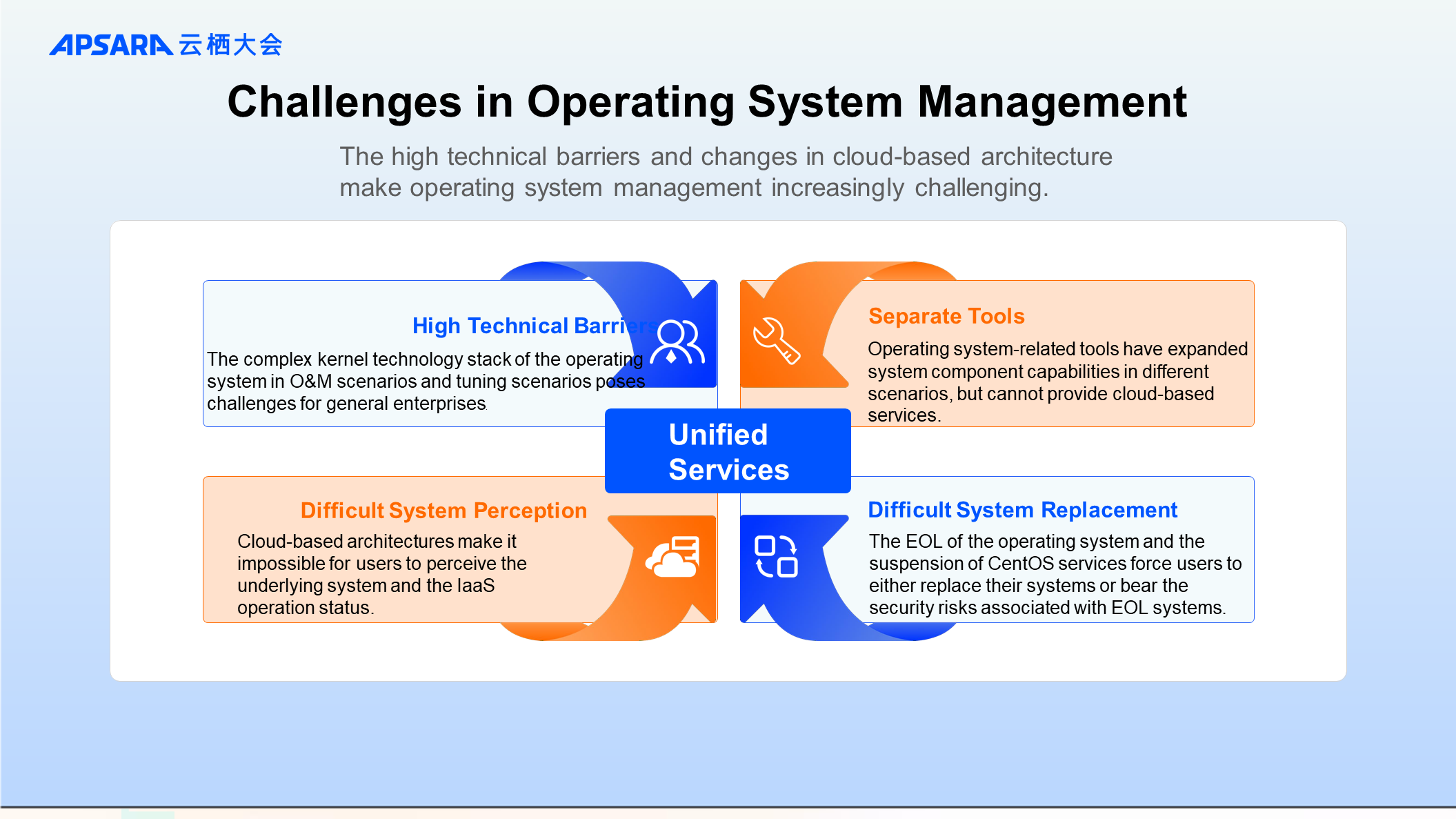
These challenges give rise to the need for better operating system management services to help users truly focus on their core business activities.
AI brings new challenges as well as new opportunities. By utilizing AI, the separate operating system tool capabilities can be unified, which simplifies the use of the operating system and resolves the management challenges that operating systems encounter. With AI as the core capability, Alibaba Cloud has launched an upgraded suite of operating system services. Over the past years, through the refinement of massive applications in the cloud and the group's Double 11 business scenarios, Alibaba Cloud has accumulated extensive experience in system management and developed a set of related tools. In parallel with sharing these resources with the OpenAnolis community, Alibaba Cloud has also benefited from tools and hardware-software collaborative capabilities that have evolved through the community's open-source projects and partnerships. On Alibaba Cloud, users can easily access a comprehensive set of intelligent AI-assisted operating system solutions through the operating system console, standard OpenAPIs, and OS Copilot.
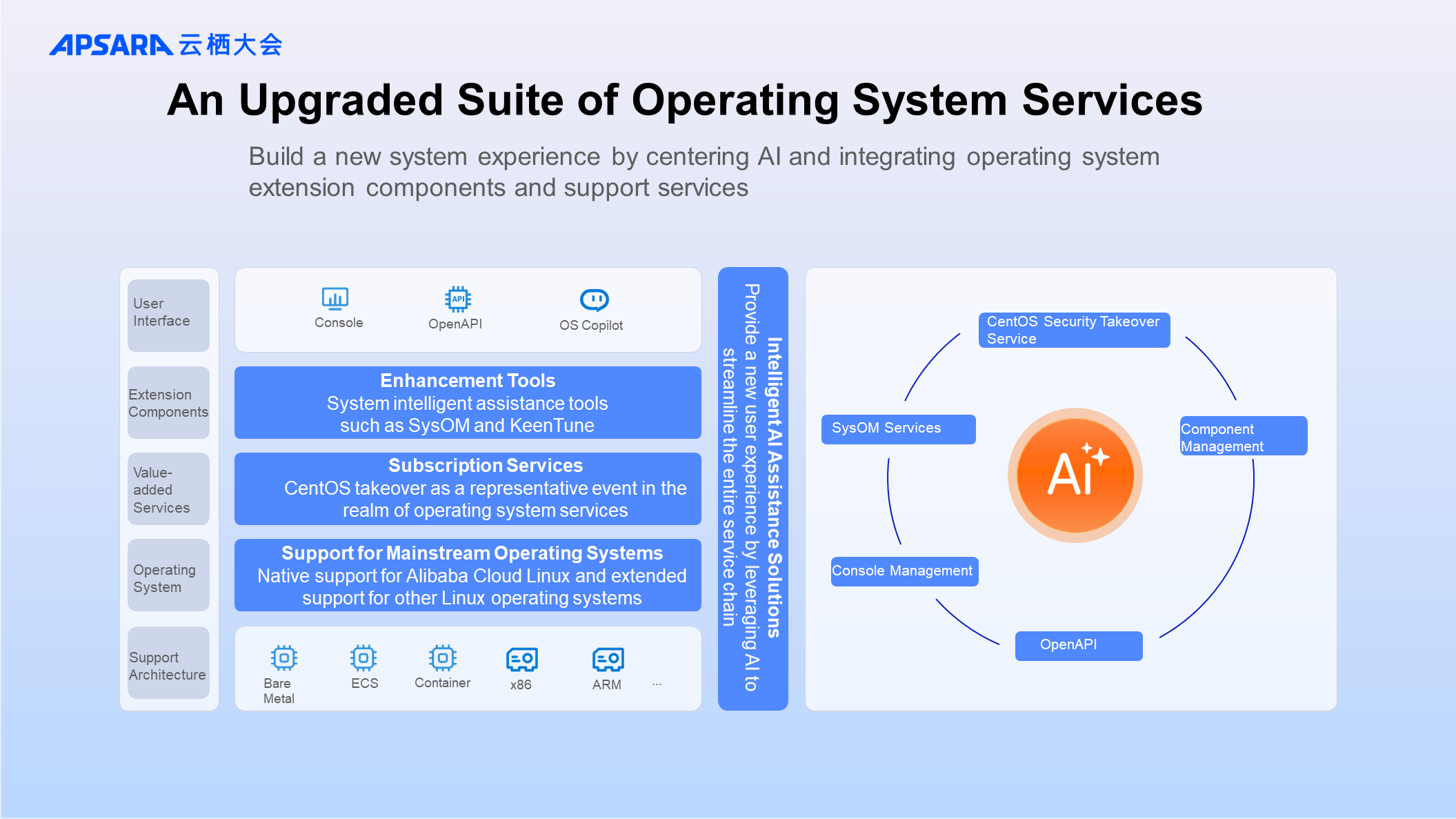
OS Copilot is an AI assistant developed by Alibaba Cloud for the operating system domain. Its core functions include command-assisted execution, professional knowledge Q&A, script/code generation, and system tool integration. With OS Copilot, users can interact through command line or terminal console, and issue instructions in natural language instead of complex command lines to complete a series of operations on the operating system. In addition to simple command execution, OS Copilot can leverage tool capabilities to complete various operating system scenarios end-to-end. It has been proved that in some specific O&M scenarios, it can help users increase O&M efficiency by at least 50%. By using the corpus training and tuning of large models in the field of operating systems, OS Copilot performs better in answering domain questions with accuracy than general large models.
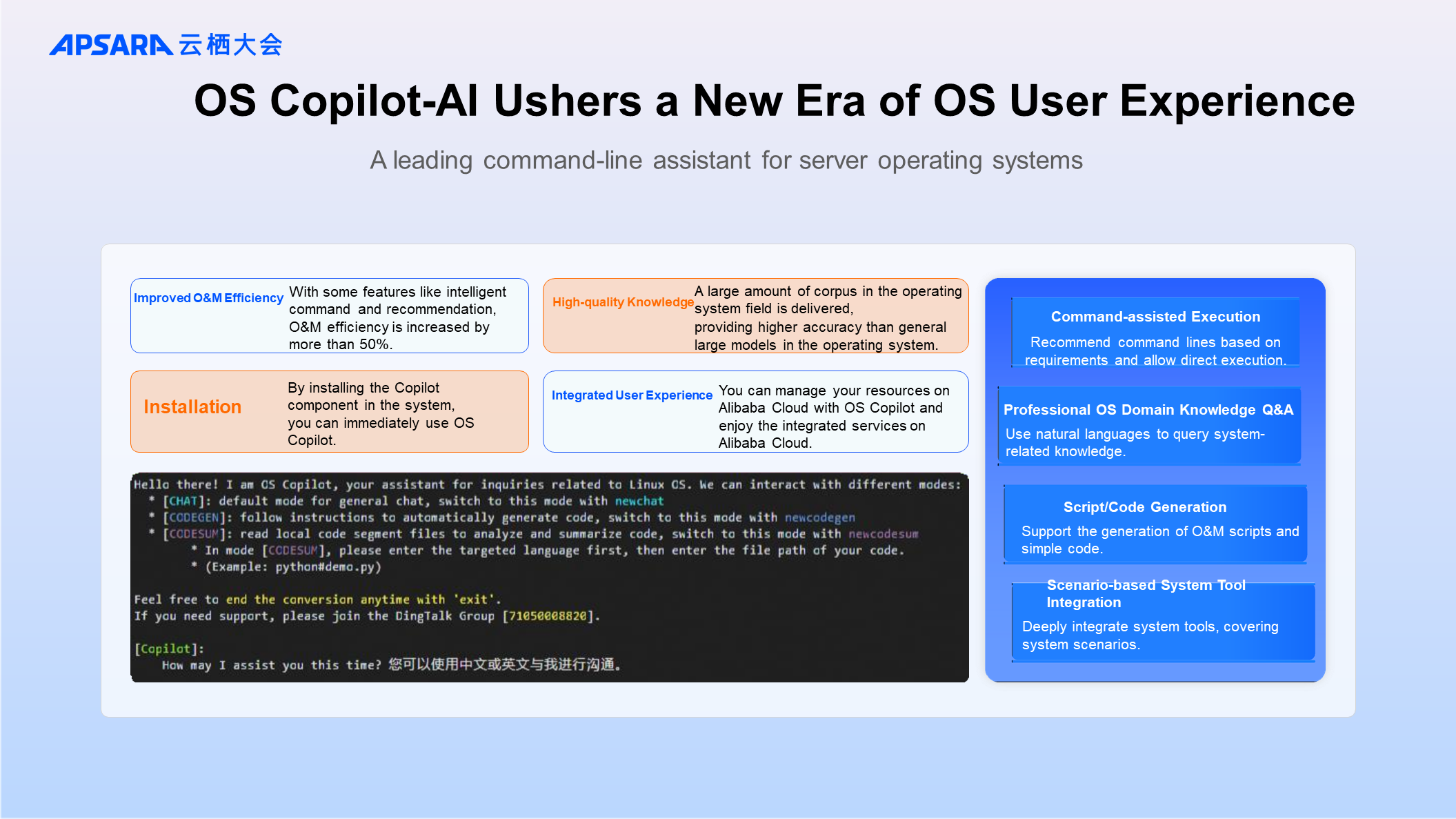
SysOM is an all-in-one operating system O&M platform jointly built by the OpenAnolis Community System O&M SIG and Alibaba Cloud. It incorporates the successful commercial O&M experience of SIG members, enabling users to manage complex operating systems on a unified platform. With the development of AI, SysOM is exploring the field of AI infrastructure observation, building a set of intelligent data analysis capabilities and O&M agents to further improve intelligence level, function accuracy, data security, experience fluency, service reliability, and cost controllability.
SysOM is a key O&M component for the operating system, and it serves as the core element of operating system management. It leverages AI to substitute the conventional methods of metric collection, monitoring, and alerting, focusing instead on system health to help users perceive the overall health status of the operating system. This approach allows for the identification of issues and the creation of an end-to-end O&M chain for comprehensive system observation.
It is quite challenging to properly perceive the health status of the system in the environment of the server operating system. On the one hand, it is difficult in terms of metric collection. Excessive metrics can not only lead to higher storage costs but also result in decreased system performance; conversely, too few metrics can bring about a lack of information, making it unable to pinpoint problems. On the other hand, the analysis of metrics is also challenging. Analyzing these metrics requires professional O&M experience to interpret the metrics and their interrelations. Finally, in a complex architecture, how to set the correlation and weight for metrics at different levels is also a challenge we face when configuring system health. Now, the upgraded SysOM possesses all these capabilities, taking a further step in system O&M capabilities. It enables users to easily detect the health status of the system, locate issues, and resolve them.
SysOM project gitee: https://gitee.com/anolis/sysom
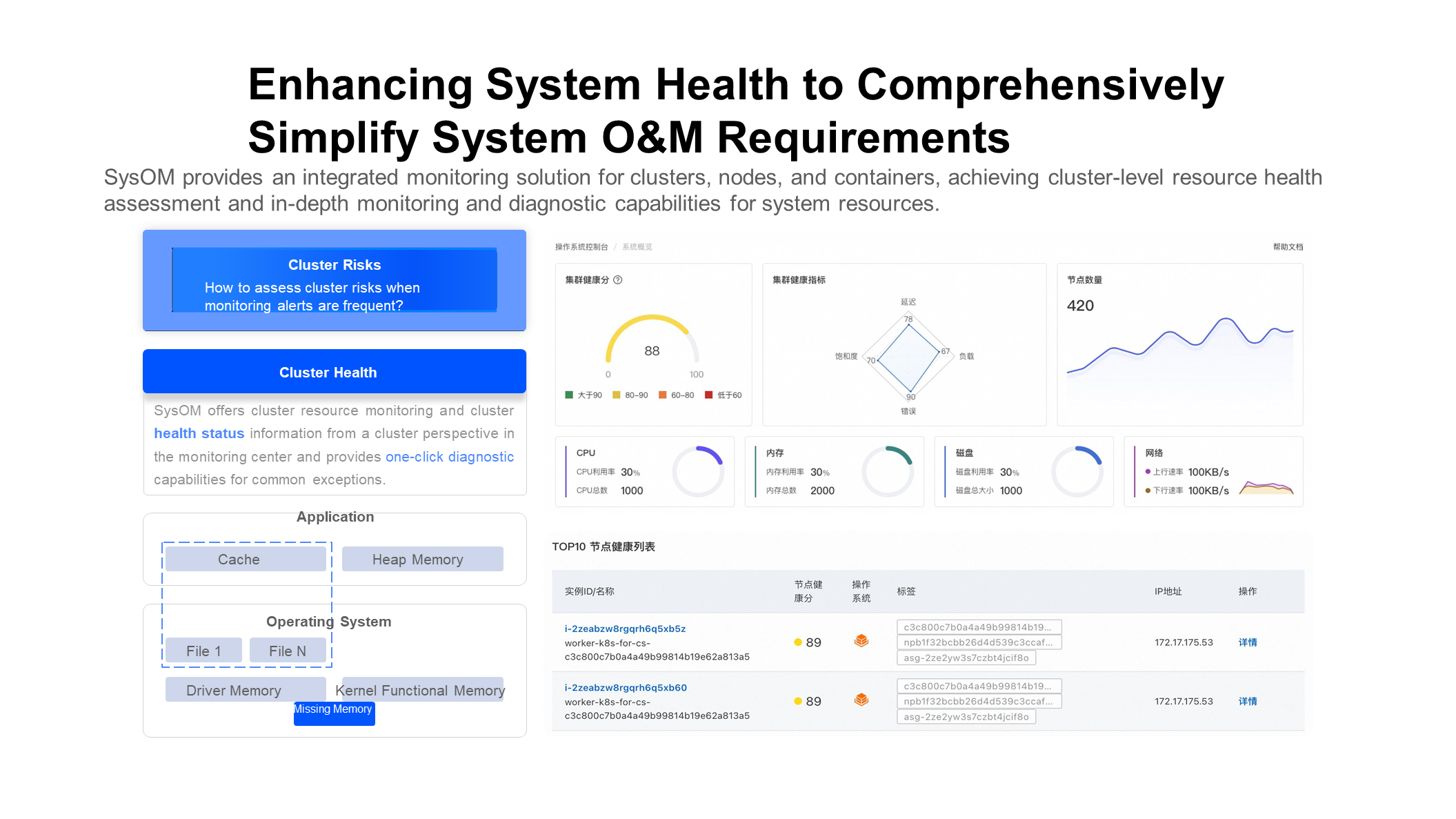
On June 30, 2024, CentOS 7 officially ended its service. This suspension has a great impact not only on CentOS enterprises and users but also on the business of Alibaba Cloud. Up to now, there are still millions of systems and hundreds of thousands of users may be affected by the security or stability risks caused by the suspension of CentOS. To ensure that users have enough time to migrate their businesses to a stable operating system, Alibaba Cloud, in collaboration with the OpenAnolis community, has launched a CentOS Security Update Subscription Service. The service provides fixes for high and critical CVEs, as well as vulnerability defects, with a free and smooth subscription process for one year. In addition, Alibaba Cloud also provides other solutions for different customer scenarios, including migration and upgrade services, to help users more smoothly complete the transition of replacing EOL systems.
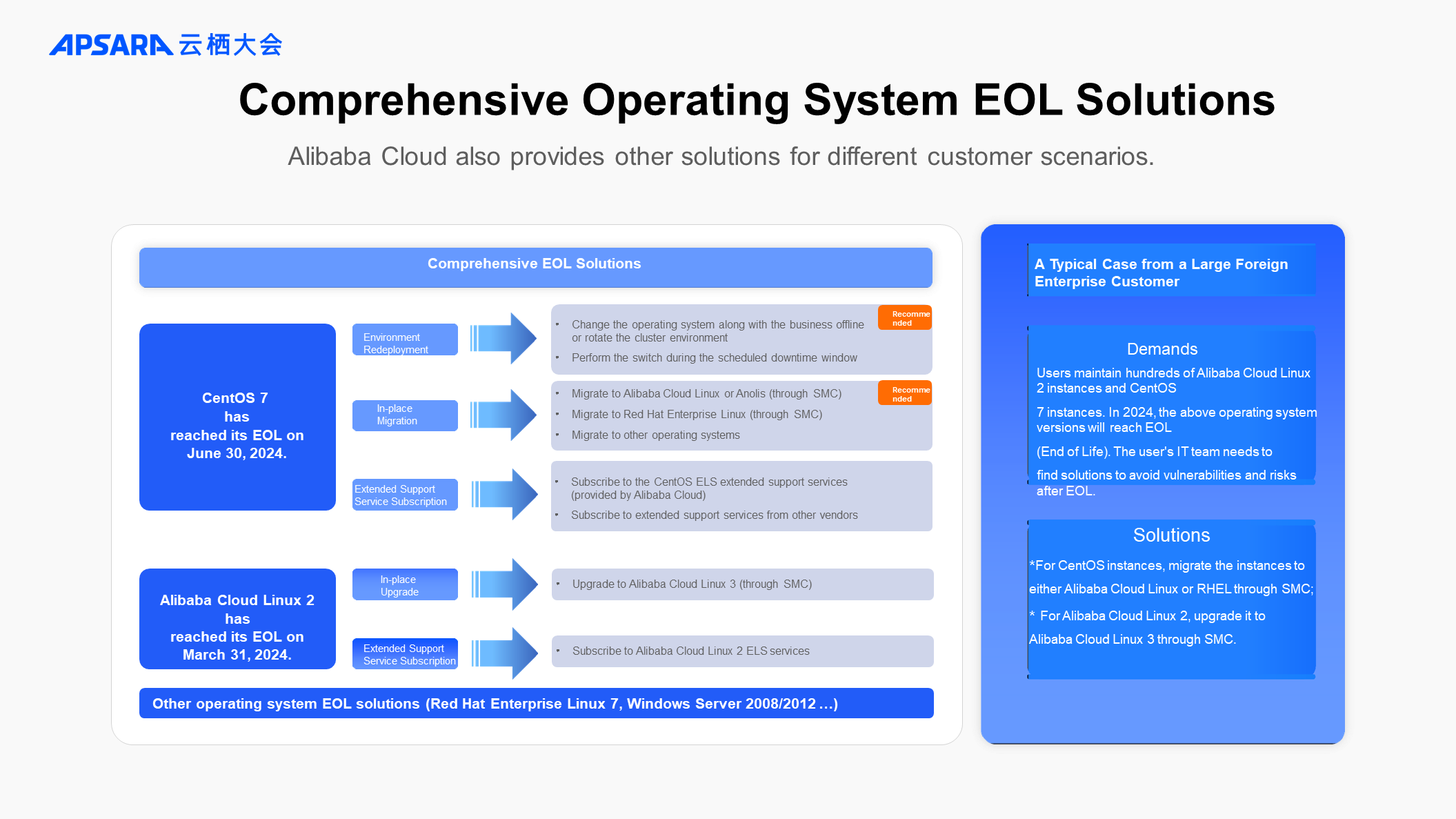
In the future, the unified services in the operating system will continue to leverage advanced technology and extensive experience to offer users smarter and more user-friendly experiences, effectively solving issues encountered in the lifecycle management of operating systems.
OS Console:
https://alinux.console.aliyun.com/
How to Deeply Use yaLanTingLibs Compile-time Reflection Library in Development

96 posts | 6 followers
FollowAlibaba Cloud Community - June 23, 2025
Alibaba Cloud Community - September 27, 2025
Alibaba Clouder - May 11, 2020
Alibaba Cloud Community - January 4, 2026
Alibaba Cloud Big Data and AI - October 27, 2025
Alibaba Cloud Big Data and AI - December 29, 2025

96 posts | 6 followers
Follow Alibaba Cloud Linux
Alibaba Cloud Linux
Alibaba Cloud Linux is a free-to-use, native operating system that provides a stable, reliable, and high-performance environment for your applications.
Learn More AI Acceleration Solution
AI Acceleration Solution
Accelerate AI-driven business and AI model training and inference with Alibaba Cloud GPU technology
Learn More Offline Visual Intelligence Software Packages
Offline Visual Intelligence Software Packages
Offline SDKs for visual production, such as image segmentation, video segmentation, and character recognition, based on deep learning technologies developed by Alibaba Cloud.
Learn More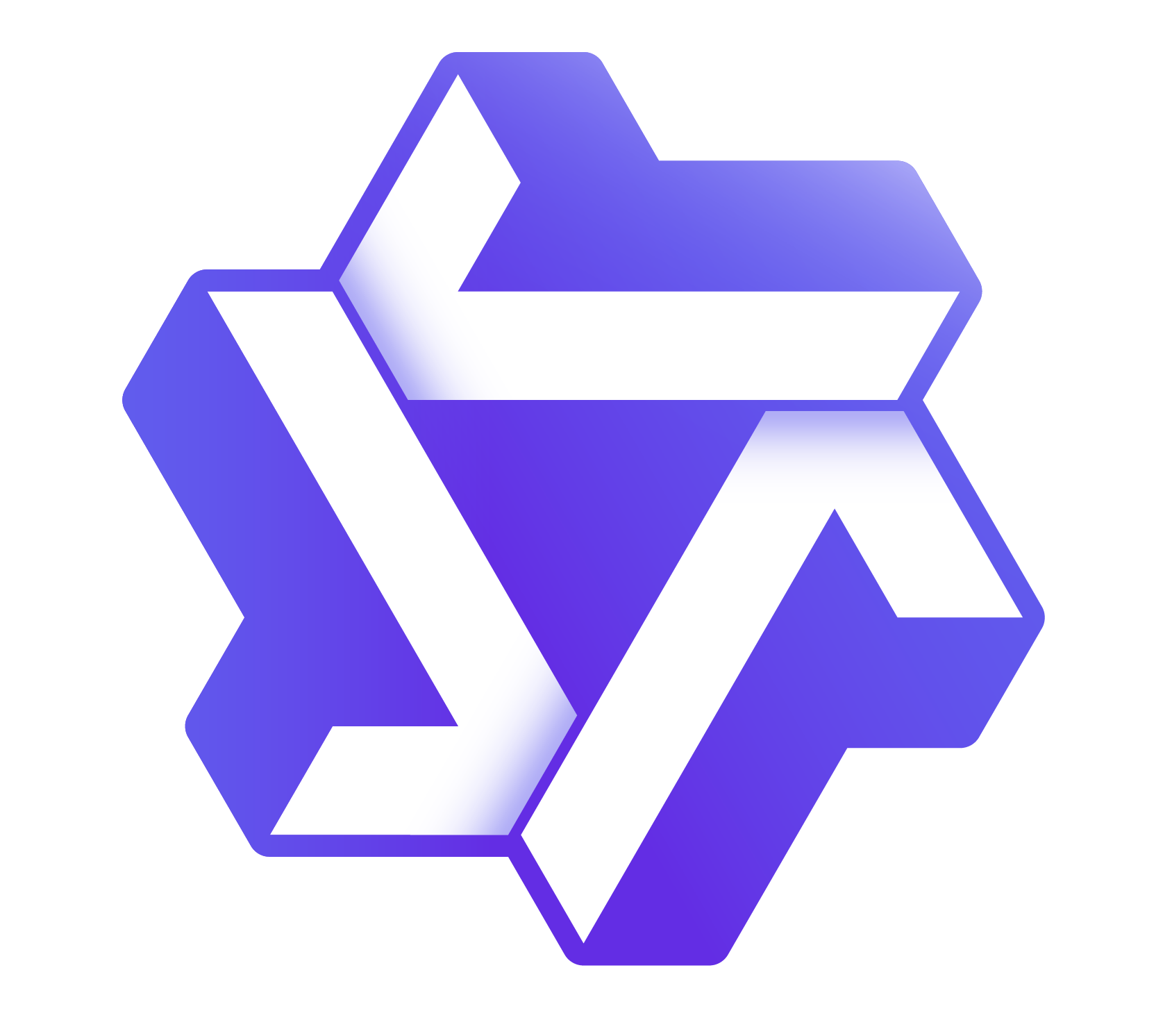 Tongyi Qianwen (Qwen)
Tongyi Qianwen (Qwen)
Top-performance foundation models from Alibaba Cloud
Learn MoreMore Posts by OpenAnolis